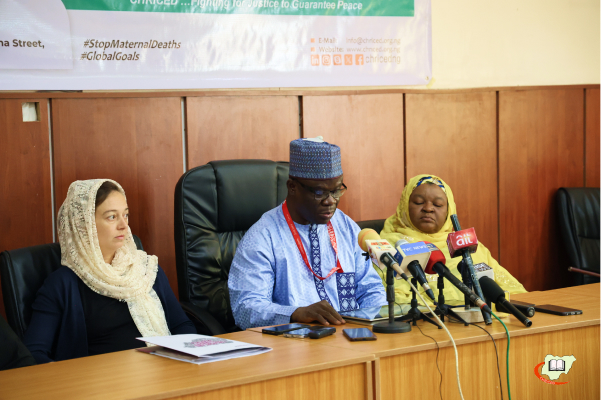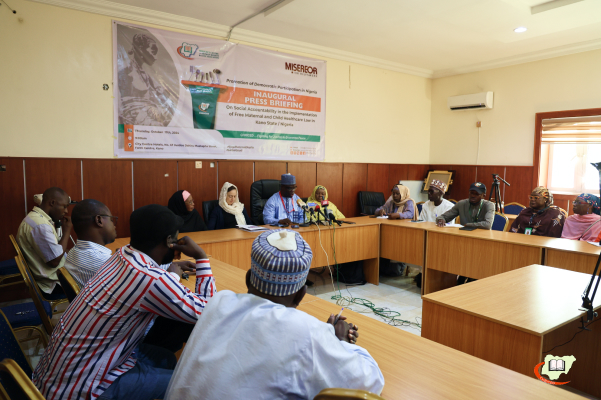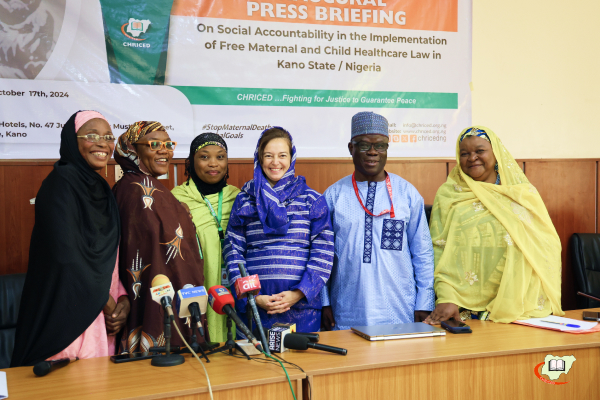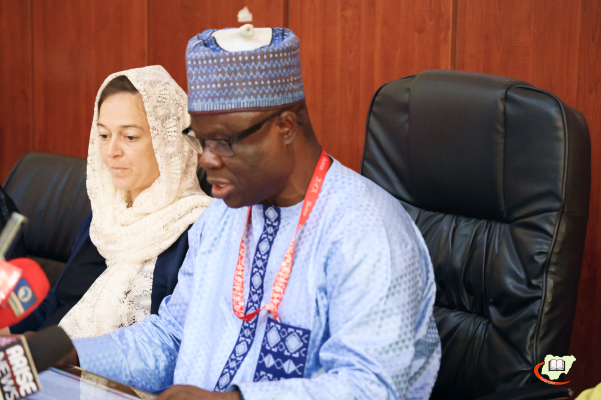On behalf of the Board of Directors, staff, and management of the Resource Centre for Human Rights & Civic Education (CHRICED), I welcome you to the formal launch of a new and exciting phase of our project, ‘Promotion of Democratic Participation in Nigeria: Social Accountability in the Implementation of Free Maternal and Child Healthcare Law in Kano State, Nigeria.’
This press briefing signifies not just a momentous occasion, but also the commencement of a comprehensive series of activities that are integral to our ambitious three-year project. Our primary objective is to facilitate the effective implementation of the Kano State Free Maternal, Newborn, and Child Healthcare (FMNCH) Law, 2023. This law represents a critical step forward in ensuring that every mother and child in Kano State has access to essential healthcare services, thereby promoting their well-being and safeguarding their rights.
About CHRICED
The Resource Centre for Human Rights & Civic Education (CHRICED) is a Nigerian non-profit, non-governmental organization. It is a knowledge-driven platform of active citizens promoting human rights, rule of law, democracy, and accountability. Established in 2006, CHRICED uses action civics, advocacy, and outreach to mobilize vulnerable and marginalized segments of the populace, including the youth, women and people living with disabilities (PWDs), to engage the democratic and governance process, within the context of their rights and responsibilities as citizens.

About the FMNCH Law, 2023
Since 2016, CHRICED has been actively engaged in collaborative efforts with key stakeholders in the maternal and child healthcare sector in Kano State. Our mission has been to foster enhanced accountability, transparency, and social justice in the allocation of budgets dedicated to maternal and child healthcare. This initiative is driven by a critical and urgent objective: to significantly reduce the alarming rates of maternal and child mortality in the region.
At the heart of our work lies a fundamental belief that no woman should have to face the tragic possibility of losing her life during childbirth. This conviction underscores our assertion that the equitable allocation of resources for maternal and child health is not merely a matter of policy but a vital necessity in the fight against maternal and child fatalities. We recognize that access to high-quality, comprehensive maternal and child healthcare services is a fundamental human right that should be guaranteed to all, rather than being treated as a privilege reserved for a select few.
This belief has propelled us to undertake the ambitious and transformative task of advocating for a robust legal framework that guarantees free maternal and child healthcare services for all women and children in Kano State, regardless of their socio-economic status. Our advocacy efforts have been extensive and multifaceted, involving a range of stakeholders, including government departments and ministries, healthcare providers, community leaders, and civil society organizations.
We are proud to share that after years of dedicated advocacy and programmatic efforts, and with the unwavering support of our esteemed partners, Misereor-KZE, we achieved a significant milestone in 2023. The Kano State House of Assembly enacted the Kano State Free Maternal and Child Healthcare law, a landmark decision that was subsequently approved by the former governor, Dr. Abdullahi Umar Ganduje. This law represents a monumental step forward in our collective efforts to ensure that every woman and child in Kano State has access to the essential healthcare services they deserve, free from financial barriers.
As we move forward, we remain committed to monitoring the implementation of this law and ensuring that it translates into tangible improvements in maternal and child health outcomes. Our work is far from over; we will continue to advocate for the rights of women and children, striving to create a healthcare system that is equitable, accessible, and responsive to the needs of all citizens in Kano State. Together with our partners and the communities we serve, we are determined to make a lasting impact on the health and well-being of mothers and children in the region.

Building upon the significant achievements and insights gained from the previous phase of the project, the current phase will focus on promoting the creation of a practical Action Plan to ensure the effective implementation of the Free Maternal and Child Healthcare (FMNCH) Law, alongside establishing a robust monitoring and evaluation system to assess the progress and impact of the Law in Kano State. Additionally, efforts will be directed towards enhancing the understanding of networks of youths, women, and persons with disabilities (PWDs) and media regarding the Kano State FMCH Law, while also equipping them with essential skills for proactive engagement with relevant government officials. Moreover, we will strive to enhance the accountability of political and civil society leaders in the execution of the FMNCH Law within the designated area.
A Call to Action
It is essential to emphasize that the successful realization of the objectives and activities outlined in the project hinges significantly on the active participation of the citizens, who are the primary beneficiaries of the Kano State Free Maternal and Child Healthcare Law. Without their engagement in monitoring the implementation of this law, the intended benefits may remain unfulfilled. Citizens play a crucial role in holding the relevant authorities accountable, ensuring that the provisions of the law are not only acknowledged but also effectively put into practice.
Moreover, it is imperative that the parties responsible for executing the law within the designated implementation agencies utilize the allocated resources judiciously and transparently. The effective management of these resources is vital to the success of the healthcare initiatives aimed at improving maternal and child health outcomes in Kano State.
As is well known, Nigeria’s challenges often stem not from a lack of well-structured laws and policies, but rather from the persistent inadequacies in their execution. This gap in implementation has consistently obstructed our national development efforts, leading to missed opportunities for progress and improvement in the lives of our citizens.
In light of this, the Resource Centre for Human Rights and Civic Education (CHRICED) strongly urges all key stakeholders involved in the Kano State Maternal and Child Healthcare framework to join forces with us in advocating for the thorough and effective implementation of the Kano State Free Maternal and Child Healthcare Law. By working collaboratively, we can ensure that the law is not merely a set of guidelines on paper, but a living framework that translates into tangible benefits for mothers and children across the state. Together, we can foster a culture of accountability and commitment that will ultimately lead to improved health outcomes and a brighter future for the people of Kano State.

Appreciation and Conclusion
As we embark on this journey, we recognize the importance of collaboration and community engagement in achieving our goals. The success of this initiative hinges on the active participation of various stakeholders, including government agencies, civil society organizations, healthcare providers, and, most importantly, the communities we serve. Through this project, we aim to foster a culture of social accountability, where citizens are empowered to hold their leaders accountable for the delivery of healthcare services as mandated by the FMNCH Law.
Over the next three years, we will be implementing a range of activities designed to raise awareness about the FMNCH Law, educate the public on their rights to maternal and child healthcare, and mobilize community members to advocate for the effective delivery of these services. We will also be working closely with local government officials and healthcare providers to ensure that they are equipped with the necessary tools and knowledge to fulfill their responsibilities under the law.
We believe that by promoting democratic participation and social accountability, we can create a more transparent and responsive healthcare system in Kano State. Together, we can ensure that the rights of mothers and children are upheld, and that they receive the quality healthcare they deserve.
At this moment, I would like to extend our heartfelt appreciation to MISEREOR-KZE, Germany, represented here today by Mrs. Julia Krojer, for its unwavering commitment to the welfare of women and children in Nigeria. When the narrative of Nigeria’s efforts to combat maternal and child mortality is documented, organizations such as MISEREOR-KZE will undoubtedly hold a significant position in that account. We also recognize the contributions of all other organizations engaged in the maternal and child healthcare sector in Kano State. To our project communities, community leaders, the Board, and the staff of CHRICED, I express my gratitude for your support and wish everyone a rewarding experience throughout this vital project.
Thank you for joining us today, and for your commitment to this vital cause. We look forward to your support and collaboration as we embark on this important journey together.

